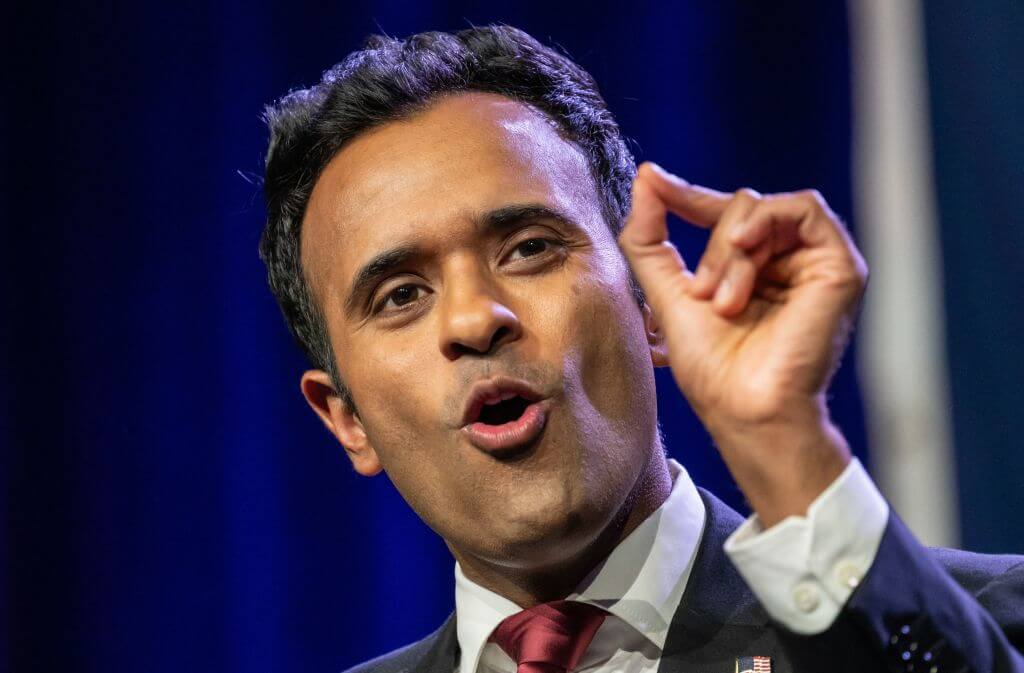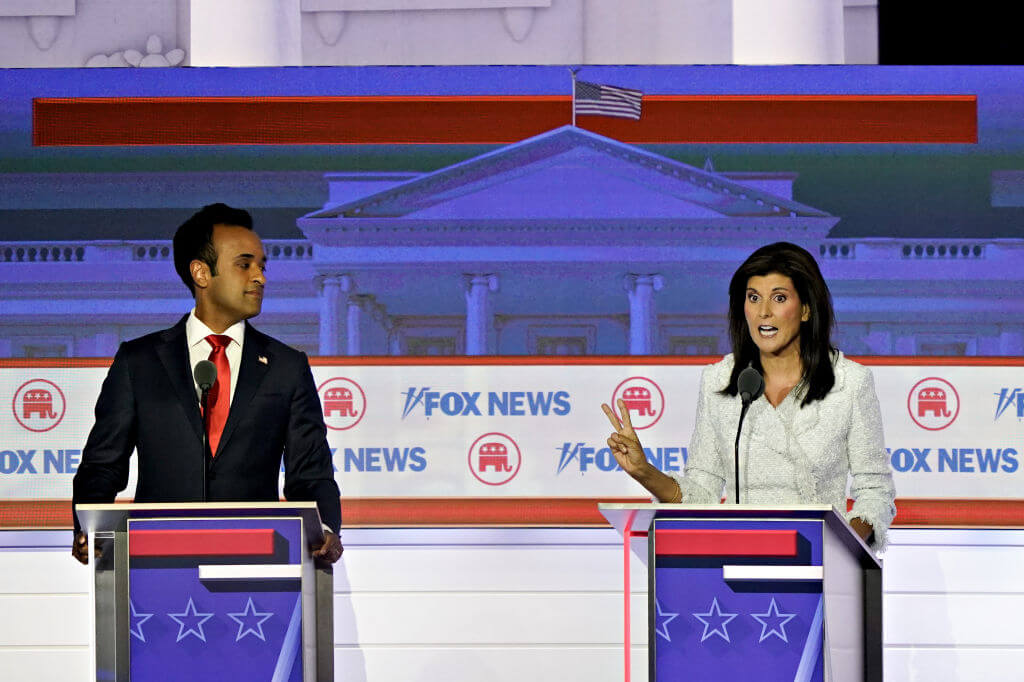Under fire for pledging to cut aid to Israel, Vivek Ramaswamy says he’s outspoken just like Israelis
The GOP presidential candidate also defended his participation in a podcast whose host trafficks in antisemitism

2024 Republican Presidential hopeful Vivek Ramaswamy on July 28, 2023. Photo by Sergio Flores/AFP via Getty Images
GOP presidential candidate Vivek Ramaswamy, who has come under fire for pledging to end Israel’s dependence on U.S. assistance, said his critics were “dead wrong” on the subject and compared his outspokenness to the way Israelis express themselves.
“That level of candor and speaking without artificial filters is exactly what me and many Israelis have in common,” Ramaswamy said. “I bring the same Israeli spirit of candor to the relationship. And it is why I have such a kinship with people in Israel and why we like each other so much.”
The 38-year-old political newcomer, a star of the first Republican presidential debate last month, went further in a Friday phone interview, elaborating on his views on Israel’s security and defending his recent participation in a podcast whose host is known to traffic in antisemitism.
The debate
On the debate stage, Ramaswamy drew the ire of other candidates and Jewish groups for saying he would cut U.S. military assistance to Israel, which currently amounts to approximately $3.8 billion annually, by 2028.
He later clarified the proposed cut as a strategy to enable Israel to become more self-reliant by encouraging its integration with Arab countries, including Saudi Arabia and Oman. At the end of his first term as president, he declared, Israel wouldn’t need additional U.S. security aid.
In the interview, Ramaswamy maintained that position. “If we ever get to the day where Israel is in such a strong position that they don’t need that U.S. aid anymore, that will be a mark of success for Israel,” he said.

And he repeated similar pledges he’s given in media appearances in recent weeks, that he is “never going to cut off aid until Israel says they’re ready for it.” He added that his plan echoed Prime Minister Benjamin Netanyahu’s position in the early ’90s: that Israel itself should voluntarily move away from its dependence on U.S. economic assistance, which amounted to $1.2 billion a year at the time.
But Ramaswamy acknowledged that the timeline he originally set for ending military aid to Israel is unrealistic. He said it would only happen if Israel normalized relations with all Arab and Muslim countries in the region and “following real change in Iran” so that it no longer poses a nuclear threat. “I’m thinking not just over a three- or four-year time horizon, but a 50-year time horizon,” he said. “I’m an optimist. The status quo does not have to remain what it is.”
Ramaswamy also suggested he has built a level of trust with Netanyahu that will strengthen the U.S.-Israel alliance.
Who is advising him?
The presidential candidate declined to name those who have advised him on Israel. He said he’s spoken to “a diverse array of people,” including Trump administration officials and former colleagues at Yale and Harvard. Ramaswamy was a member of Shabtai, a Jewish leadership society at Yale founded in 1996 as an alternative to the “secret societies” at the university.
He named three officials, however, with whom he has recently had conversations about Israel: Yaakov Amidror, a former national security adviser to Netanyahu; Victoria Coates, the former deputy national security adviser in the Trump administration; and Simcha Rothman, the hawkish Israeli lawmaker who is chair of the Knesset’s constitution and law committee. Rothman, who is playing a leading role in the Israeli government’s judicial overhaul plan, reportedly recorded a podcast interview with Ramaswamy on Thursday.
Ramaswamy said he was “disappointed” by fellow candidates Nikki Haley, the former U.N. ambassador, and former Vice President Mike Pence, who questioned his commitment to Israel and his readiness for the presidency. He said his remarks are often “distorted because I’m not saying them in the same way that a standard politician does.”
The podcast
Ramaswamy in the interview also defended his recent appearance on a podcast hosted by Albert Faleski, a YouTuber known for promoting antisemitic content and conspiracy theories. Faleski, also known as An0maly, has trafficked in stereotypes about Jews and dual loyalty and criticized the Republican Party for favoring Israel over the U.S. The American Jewish Congress condemned Ramaswamy for “mainstreaming and legitimizing fringe, hate-filled individuals like Faleski by joining them on their shows.”
“This is such a bizarre criticism for me to get,” Ramaswamy said of Faleski. “The guy, he has been criticizing me daily, like viciously criticizing me, bashing me daily to his audience. And he bashed me when I came on.”
Ramaswamy said he wasn’t aware of Faleski’s antisemitic views before he went onto the show. “The only clips that I saw were things that he was saying that were wrong and ill-spirited towards me,” Nonetheless, he said, “my bet is many of the things that he said about me may be far worse than what he said about, you know, Israel or Jewish people.”
Ramaswamy remained noncommittal about appearing in the future on shows that are hosted by white nationalists or antisemites.
“I will talk to anyone,” he said. “I don’t believe in cancel culture. I would never bar anybody from the list of people I would talk to.
“But” he added, “just because you talk to somebody doesn’t mean that you support what they say. And if somebody says they support me, but are deeply misaligned with my own values, I will be the first to say it if I come to know that.”
A message from our Publisher & CEO Rachel Fishman Feddersen

I hope you appreciated this article. Before you go, I’d like to ask you to please support the Forward’s award-winning, nonprofit journalism so that we can be prepared for whatever news 2025 brings.
At a time when other newsrooms are closing or cutting back, the Forward has removed its paywall and invested additional resources to report on the ground from Israel and around the U.S. on the impact of the war, rising antisemitism and polarized discourse.
Readers like you make it all possible. Support our work by becoming a Forward Member and connect with our journalism and your community.
— Rachel Fishman Feddersen, Publisher and CEO





























